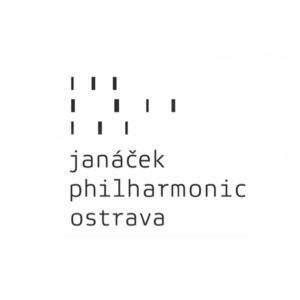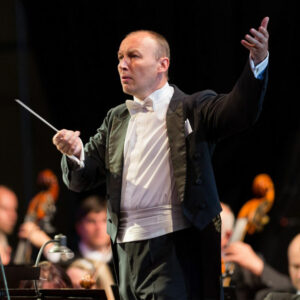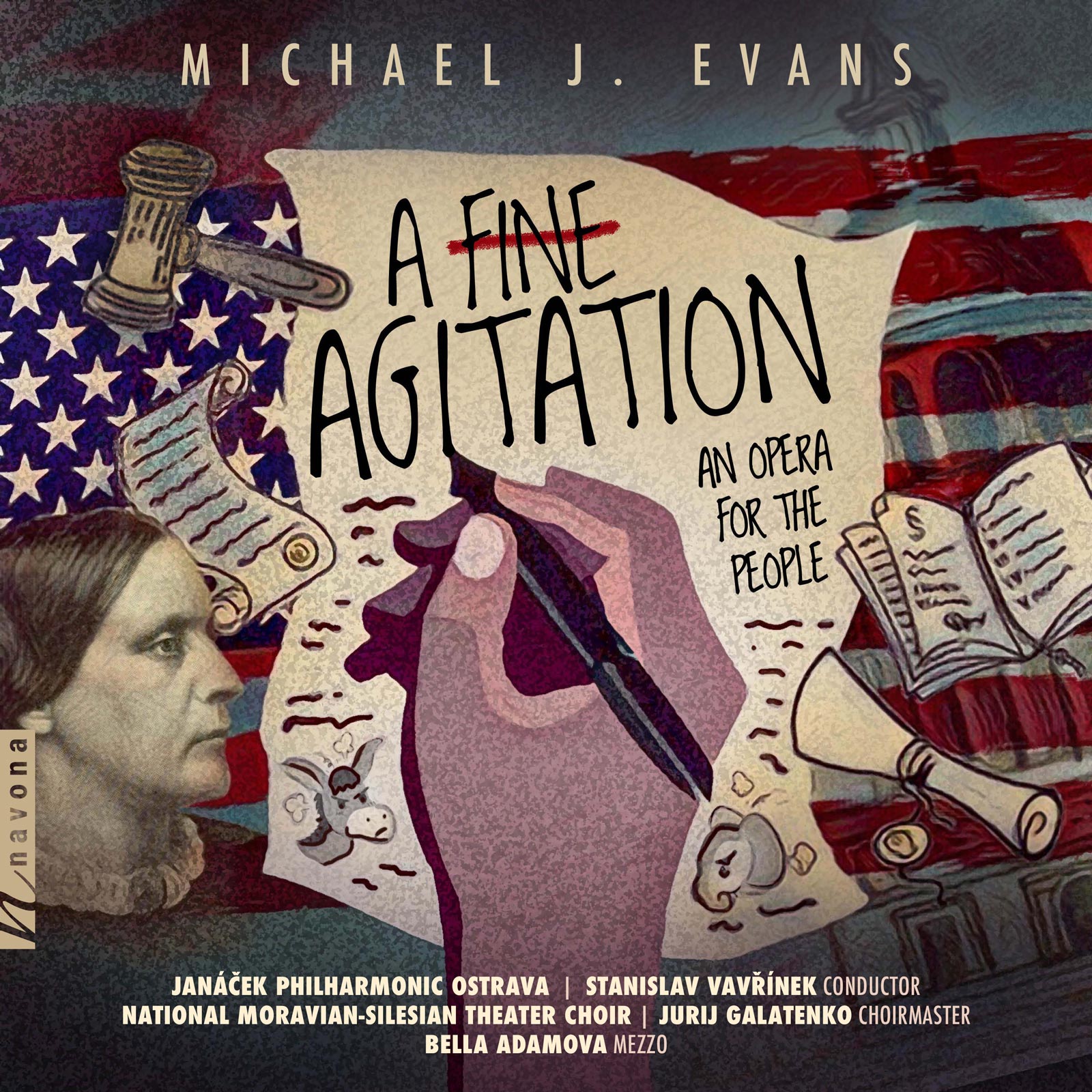A Fine Agitation
Michael J. Evans composer
Janáček Philharmonic Ostrava | Stanislav Vavřínek conductor
National Moravian-Silesian Theater Choir | Jurij Galatenko choirmaster
Bella Adamova mezzo
Strong convictions make for strong emotion, and in Michael J. Evans’ case, emotion transforms into operatic scenes. A FINE AGITATION is an eight-part stage work based on Susan B. Anthony’s letters during her infamous voting trial, which sheds light on the beloved social reformer from a personal, intimate, and profoundly charming angle.
Both biographies and political subjects are notoriously difficult to set to music without becoming either dry tragedies or kitschy pastiches, but Evans circumvents this pitfall with a compositional style that is subtly, tastefully shaded, and at times almost light-footed. It shows Anthony, an American social justice icon, from a perspective that might have been disregarded for the better part of a century – the perspective of being human.
Listen
Stream/Buy
Choose your platform
An Inside Look
Michael J. Evans – A Fine Agitation
Track Listing & Credits
| # | Title | Composer | Performer | |
|---|---|---|---|---|
| 01 | Scene 1: Letter to Elizabeth Cady Stanton, November 5, 1872 | Michael J. Evans | Janáček Philharmonic Ostrava | Stanislav Vavřínek, conductor; National Moravian-Silesian Theater Choir | Jurij Galatenko, choirmaster; Bella Adamova, mezzo | 15:53 |
| 02 | Scene 2: Letter to Sarah Huntington, November 11, 1872 | Michael J. Evans | Janáček Philharmonic Ostrava | Stanislav Vavřínek, conductor; National Moravian-Silesian Theater Choir | Jurij Galatenko, choirmaster; Bella Adamova, mezzo | 3:32 |
| 03 | Scene 3: Burlesque, November 18, 1872 | Michael J. Evans | Janáček Philharmonic Ostrava | Stanislav Vavřínek, conductor; National Moravian-Silesian Theater Choir | Jurij Galatenko, choirmaster; Bella Adamova, mezzo | 3:06 |
| 04 | Scene 4: Diary Entries, January 21-23, 1873 | Michael J. Evans | Janáček Philharmonic Ostrava | Stanislav Vavřínek, conductor; National Moravian-Silesian Theater Choir | Jurij Galatenko, choirmaster; Bella Adamova, mezzo | 2:58 |
| 05 | Scene 5: Indictment | Michael J. Evans | Janáček Philharmonic Ostrava | Stanislav Vavřínek, conductor; National Moravian-Silesian Theater Choir | Jurij Galatenko, choirmaster; Bella Adamova, mezzo; Aleš Pirnos, tenor | 9:38 |
| 06 | Scene 6: Diary Entry, January 24, 1873 | Michael J. Evans | Janáček Philharmonic Ostrava | Stanislav Vavřínek, conductor; National Moravian-Silesian Theater Choir | Jurij Galatenko, choirmaster; Bella Adamova, mezzo | 3:07 |
| 07 | Scene 7: Letter to Martha Coffin Wright in Auburn, New York after her indictment for illegal voting | Michael J. Evans | Janáček Philharmonic Ostrava | Stanislav Vavřínek, conductor; National Moravian-Silesian Theater Choir | Jurij Galatenko, choirmaster; Bella Adamova, mezzo | 7:06 |
| 08 | Scene 8: Diary Entry, March 4, 1873 | Michael J. Evans | Janáček Philharmonic Ostrava | Stanislav Vavřínek, conductor; National Moravian-Silesian Theater Choir | Jurij Galatenko, choirmaster; Bella Adamova, mezzo | 5:01 |
Recorded November 7-11, 2022 at Vesmír Concert Hall in Ostrava, Czech Republic
Producer, Editing & Mixing Jan Košulič
Engineer Aleš Dvořák
Assistant Engineer Adam Janků
Additional Editing Melanie Montgomery
Mastering Melanie Montgomery
Executive Producer Bob Lord
A&R Director Brandon MacNeil
A&R Danielle Sullivan
VP of Production Jan Košulič
Production Manager Martina Watzková
Audio Director Lucas Paquette
VP, Design & Marketing Brett Picknell
Art Director Ryan Harrison
Design Edward A. Fleming, Morgan Hauber
Publicity Patrick Niland
Artist Information

Michael J. Evans
Michael J. Evans is an American composer based in Washington DC He has recorded with pianist Karolin Rojahn, Sirius Quartet, St Petersburg State Symphony Orchestra, Millennium Symphony Orchestra, Kiev Philharmonic, Prague Radio Symphony Orchestra, Moravian Philharmonic and Janaček Philharmonic.

Janáček Philharmonic Ostrava
The Janáček Philharmonic is a world-class symphony orchestra based in Ostrava, Czech Republic and an emerging figure on the international performance scene. With over 100 top-level musicians, the orchestra aims to introduce unique, quality repertoire while showcasing their own recognizable sound.

Stanislav Vavřínek
Stanislav Vavřínek is one of the most prominent Czech conductors and has been Chief Conductor of the Czech Chamber Philharmonic Orchestra Pardubice since 2018. Having graduated from the Conservatory in Brno where he studied flute and conducting, he continued his education at the Academy of Performing Arts in Prague. Subsequently, he also took master classes with Roberto Benzi in Switzerland, culminating with a concert in which he conducted the Biel Philharmonic Orchestra.

Jurij Galatenko
Jurij Galatenko attended the National Academy of Ukraine from 1991 to 1995, focusing his studies on opera and symphonic conducting. He graduated in opera conducting by rehearsing a rendition of Mozart’s opera The Marriage of Figaro, and graduated in symphonic conducting by rehearsing a rendition of Dvořák’s Symphony No. 9 From The New World and Chopin’s Concerto for Piano and Orchestra No. 2.

Bella Adamova
“A voice that apparently can do anything” — mezzo-soprano and improviser Bella Adamova grew up in Prague, Czech Republic torn between, and surrounded by many cultures. This has translated to a versatility as a musician – always occupying the space somewhere in between genres. She completed her Bachelor’s in Vocal performance in London’s Trinity Laban Conservatoire of Music and Dance, and her Master’s in Cologne, Germany.

Aleš Pirnos
A young Czech tenor, Aleš Pirnos collaborates with the opera ensemble of the National Moravian-Silesian Theater. He also works with Canticum, a group specializing in the interpretation of contemporary classical music. Pirnos finished his studies at Janáček conservatory in Ostrava in 2020 and now continues on at Ostravská Univerzita with famous Slovak opera singer Martin Gurbal. He has also attended singing lessons with Jan Ballarin, and in August 2018 he took part in master courses led by Martina Janková and Markéta Cukrová.
Notes
One day, while reading the newspaper, I came across an article equating the arguments made in defense of Susan B. Anthony during her voting rights trial with the arguments made for DC Statehood. Being a DC resident, and a firm supporter of statehood, I decided to do a little more research. I quickly realized that this was an important story to tell; and one that would be perfect for an opera.
The documents I came to love most were Ms. Anthony’s letters and her speech before sentencing. The letters are filled with emotion and humor: they allowed me to see her as a real person, not just some name from history books.
Susan B. Anthony was a Republican: and, at that time, the Republican Party was in support of women’s suffrage as well as the abolition of slavery. Democrats, at the time, were opposed to these ideas.
When I discovered the article and began my research in 2018, not only was the current administration Republican, but the party had now come to represent misogyny, racism, homophobia, antisemitism, and xenophobia. Additionally, the leader of both the party and the country at that time, (a Republican), was on the record as a blatant misogynist and racist.
The work is dedicated to Vice President Kamala Harris, a Democrat. She is the first woman, the first Black American, and the first South Asian American to be elected vice president, as was the case with other offices she has held. And, as stated on her whitehouse.gov page, “she is, however, determined not to be the last.”
I couldn’t help but be struck by how much the two parties had changed over time and wanted to show the contrast between what the Republican Party was, and what it had become. In composing this work, I wondered what Ms. Anthony would have thought and said about it. After reading her letters, speeches, and trial transcript, I’m positive that she would be happy to tell us; and, as she said before being sentenced (as a woman, she was not even allowed to take the stand in her own defense), and, as her character sings in Act 2: “I have many things to say.”
— Michael J. Evans

